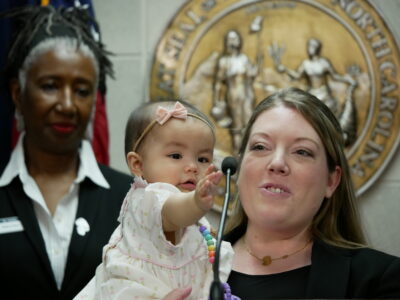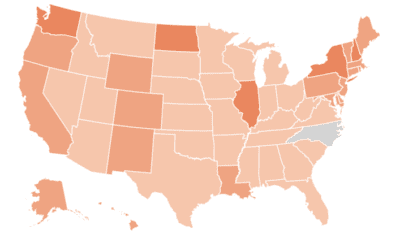

In an interview with three Biden administration debt-ceiling negotiators, MSNBC host Lawrence O’Donnell, who once worked on the U.S. Senate staff, got the nation’s budget director Shalanda Young talking about child care.
Young, a Democrat and mother of a toddler, said she and U.S. Rep. Patrick McHenry, a North Carolina Republican and father of three, had forged a “bond” as they dealt with their own child care arrangements amid the tense talks that resulted in a bipartisan deal.
“He did not mind calling me on the way to drop-off because he would hear my child,” Young said of McHenry. “We would both ignore that and keep talking.”
Of course, a congressman and a high-ranking executive official can afford to place their preschool children in a five-star facility. But for tens of thousands of North Carolina families, high-quality child care is out of reach — too expensive or too little supply. Filling the gap is an informal fleet of grandmothers, aunts, friends, and neighbors.
“In the United States, more than half (53 percent) of the labor force are parents and over a third of these parents (37 percent) have young children,” says a new analysis from the Early Care and Education Work Group of the Federal Reserve system. “Regardless of persistent demand for licensed child care, a tension between what parents can afford to pay and what most providers need for operations results in very narrow profit margins. This in turn results in significant supply challenges that manifest as employment barriers for low- to moderate-income parents.”
While child care policymaking is not a core FED function, the fact that it assembled a study group and has collected state data sends a message of the importance of investment in care and education of children before formal schooling. The work group paper points to “evidence that links quality early childhood development to better school readiness and more educated workers,” and it observes that “when the cost of care is too high, many parents opt for informal care or exit the labor force.”
In North Carolina, the labor and economic analysis (LEAD) unit of the state Department of Commerce has monitored the child care situation in terms of the broader economy. Like many analysts, the LEAD unit cites the dramatic disruption resulting from the COVID-19 outbreak.
“Child care providers in the state are dealing with considerable labor shortages and have struggled to bring back jobs lost during the pandemic,” says a recent LEAD analysis. “In 2021, there were about 2,000 fewer child care workers in North Carolina than in 2019 before the COVID-19 pandemic. Even before the pandemic, child care providers routinely dealt with staffing challenges. The hot economy following the brief pandemic recession simply made these issues much worse.”
While such national and state data analyses piled up, it also seemed that forces were arraying to try to motivate the Republican-majority in the General Assembly to bolster the state’s mixture of child care subsidies, NC Pre-K, and Smart Start. At issue was whether state government would step up as federal pandemic relief funding faded away.
A group of North Carolina CEOs called for more NC Pre-K funding. Releasing a survey, the NC Chamber Foundation reported that North Carolinians perceive a “child care crisis,” and that nine out of 10 voters support increased funding. The bipartisan Hunt-Lee Commission (disclosure: I was a member) called for an increase in child care subsidies and greater access to NC Pre-K. The bipartisan Early Childhood Caucus of legislators came up with a proposal for $300 million for compensation grants to avoid a fiscal cliff when federal relief funds run out.
And yet, despite stress on working families, on child care providers, and on the economy, the two-year budgets adopted by the House and Senate would keep the state running in place, barely advancing North Carolina’s efforts in early care and education. Lawmakers tucked into the abortion-restriction law $75 million in subsidies for child care centers and homes, which was carved out in the Senate budget proposal. The Senate budget redirects left-over federal funding to compensation grants. The House provided $24 million more for subsidies, $10 million for Smart Start, and a one-time $900,000 in each of the next three years to establish a three-county child care pilot.
There will soon be talk of a budget “compromise.” But, in child care and early education, it won’t be a compromise with Gov. Roy Cooper’s expansive $900 million agenda, or with the legislative caucus’s $300 million proposal. The outcome is more likely to fall between not much and even less. And the upshot is that hardly any more North Carolinians will have the quality early care and education afforded the children of Congressman Patrick McHenry and federal Budget Director Shalanda Young.




